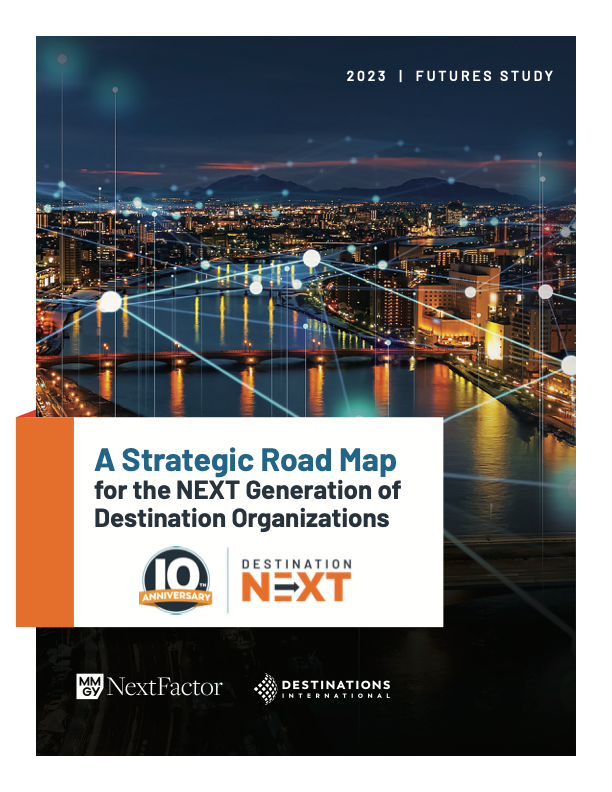Destinations International (DI) announced the release of its latest DestinationNEXT Futures Study at its 2023 Annual Convention in Dallas, July 18-20.
More than 800 destination leaders from 62 countries responded to the survey on trends affecting both leisure tourism and business events. The study, underwritten by a grant from the Destinations International Foundation, was prepared for DI by MMGY NextFactor and guided by a global advisory group representing leading DMOs.
When comparing the findings in this survey to the 2021 version, it becomes apparent that DMOs are now playing a larger role in community and destination development. In their roles in the coming years, destination leaders said that destination and product development will be among their top five priorities, preceded by destination marketing, data research and intelligence, and brand management, and followed by community relations and partnerships.
Insights for Business Events
 Four advisory panels were established to provide different perspectives on the future of destination marketing for the study. The takeaways from the client panel, comprised of meeting planners, event organizers, and tour operators, are:
Four advisory panels were established to provide different perspectives on the future of destination marketing for the study. The takeaways from the client panel, comprised of meeting planners, event organizers, and tour operators, are:
- We live in an omnichannel world and the business events industry needs to deal with it. We can’t afford to have a binary approach to events, thinking that digital events were strictly a Band-Aid to help carry us through the pandemic, but that we are now back to focusing solely on face-to-face events. The business events industry has to figure out how to advance hybrid models in a profitable way.
- The surge of business events returning globally is creating significant capacity issues. Space and air service availability are key concerns. Air service to secondary markets has been diminished, causing added compression in first-tier cities.
- Business events professionals are now demanding empirical proof of how destinations and venues are supporting efforts to less carbon impact and increase equity, diversity and inclusion across their entire supply chains. It has become part of the RFP process.
- Both streamlining and optimizing events has become a business imperative — shortening and simplifying the program while leveraging the experiential elements of live events.
- The impact of global inflation and weakened supply chains should not be underestimated. Increased costs for every aspect of events are not only challenges for organizers, they’re having an impact on attendee choices. The expectation is that attendees who previously traveled to four to five events each year will now only go to two to three. The pressure is on for organizers to make their event a top pick.
- Staffing challenges across the business industry make organizers’ jobs even more difficult. Staffing changes continue, with new staff at hotels, venues, and among other suppliers often younger and inexperienced and without the same level of decision-making ability. Event organizers are finding that many of their longtime contacts have left the industry, and the planning process now feels transactional rather than relationship-centered and strategic — making it “simply not enjoyable anymore to work under these conditions.”
Download the full report at destinationsinternational.org.
Michelle Russell is editor in chief of Convene.
